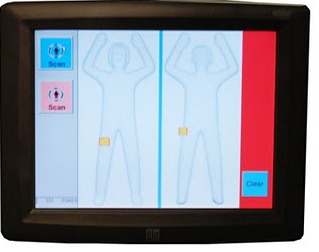TSA And Gender Profiling
By Erin McElroy
17 October, 2012
Countercurrents.org
 As I stood in the slowly moving line toward the full-body scanner at San Francisco International Airport this past July, the last thing on my mind was my relationship to gender. Probably like most people in line, an array of thoughts were swimming through my head, some more banal than others. I was about to present at a conference on racism sanctioned upon Roma communities through transnational praxes of securitization, and perhaps my paper abstract was most poignant in my head as I approached the TSA. Mindlessly I took off my jacket and sneakers, and upon instruction, entered the claustrophobic space of the full-body scanner. Following orders, I lifted my hands as if being interrogated by an armed officer, and then walked out, ready to retrieve my bags from the conveyor belt.
As I stood in the slowly moving line toward the full-body scanner at San Francisco International Airport this past July, the last thing on my mind was my relationship to gender. Probably like most people in line, an array of thoughts were swimming through my head, some more banal than others. I was about to present at a conference on racism sanctioned upon Roma communities through transnational praxes of securitization, and perhaps my paper abstract was most poignant in my head as I approached the TSA. Mindlessly I took off my jacket and sneakers, and upon instruction, entered the claustrophobic space of the full-body scanner. Following orders, I lifted my hands as if being interrogated by an armed officer, and then walked out, ready to retrieve my bags from the conveyor belt.
But before I was able to make my way to my bag, a TSA officer approached and obstructed my way. “Excuse me,” he queried, his face less than a foot from mine, “Are you female, or a guy?”
What?
True, my gender confuses people often. I was born female, and then began transitioning to male several years ago. After a year of transitioning, I decided that rather than fully pass as male, I wanted to remain more ambiguous. Not only did I feel most myself enacting androgyny, but politically I also preferred subverting the gender binary over performing one side of it or the other. Sure, this choice has come with risk and compromise, and I find myself having to practice strategic essentialism throughout various contexts, often to avoid harassment. It hadn't occurred to me up until this airport moment, that TSA checkpoints were one of these contexts.
“Are you female, or a guy?” He was attempting to conceal a smirk below his professional stoicism.
“Why does it matter?” I cautiously inquired.
“We didn't recognize your body in the body scan,” he explained, matter-of-factly. “And so we need to pat you down. We need to know which gender TSA officer should perform the pat-down.”
Ah ha! So because my body was not recognizable on the scan, I needed to be further examined. Not because I contained any suspicious objects, but because my gender was deviant. Frustrated and dejected, I pointed to a female TSA officer nearby, and said that she could pat me down. The whole thing took less than a minute, and soon enough I was on my way to the terminal, growing more confused and angry with each step.
Over the past decade, we have witnessed increased practices of racial profiling in airports and other checkpoints. As Islamaphobia continues to foment across the West, people of color, particularly those from the global south, are given extra attention. Even American citizens wearing turbans, hijabs, or other garb that the West ignorantly associates with terrorist threats, are often told to step aside for secondary screenings. A growing number of academics are responding to this, critiquing contemporary formations of securitization that conflate both internal and external 'Others' with enemy-terrorist. Over the past several years, I have been engaging many of these theorists to think anti-Roma violence across postnational Europe.
Up until this moment of secondary screening in the San Francisco airport, it hadn't quite occurred to me that perhaps gender deviancy had also become a qualifier in entry to the Western category of enemy. What does gender have to do with the detection of metallic and non-metallic weapons and explosives that might be hidden beneath layers of clothing? Why do the newest scanners require screeners to select male or female for the person being screened? When revealing the latest software, a representative of the TSA Office of Civil Rights and Liberties, External Compliance and Public Outreach Division, explained that if an anomaly appears in a person's gender presentation, most likely they will be selected for secondary screenings. As many transgender and gender-queer people are perennially targeted in every-day life, and as many have trauma associated with past targeting, being singled out and objectified in the name of national security can feel especially violating. I was traveling alone, and having my 'confusing' body doubly scrutinized left me feeling even more alienated, and angry. Are these the kinds of feelings that national security praxes what to engender in airports? Does targeting people for complex relationships to the construct of gender make airport travel more safe?
Erin McElroy is a scholar and social justice worker whose work revolves around deconstructing formations of state and transnational racism sanctioned upon Roma communities across Europe. Erin lives in San Francisco, where they are also involved in local transgender and genderqueer movements. [email protected]
Comments are moderated


